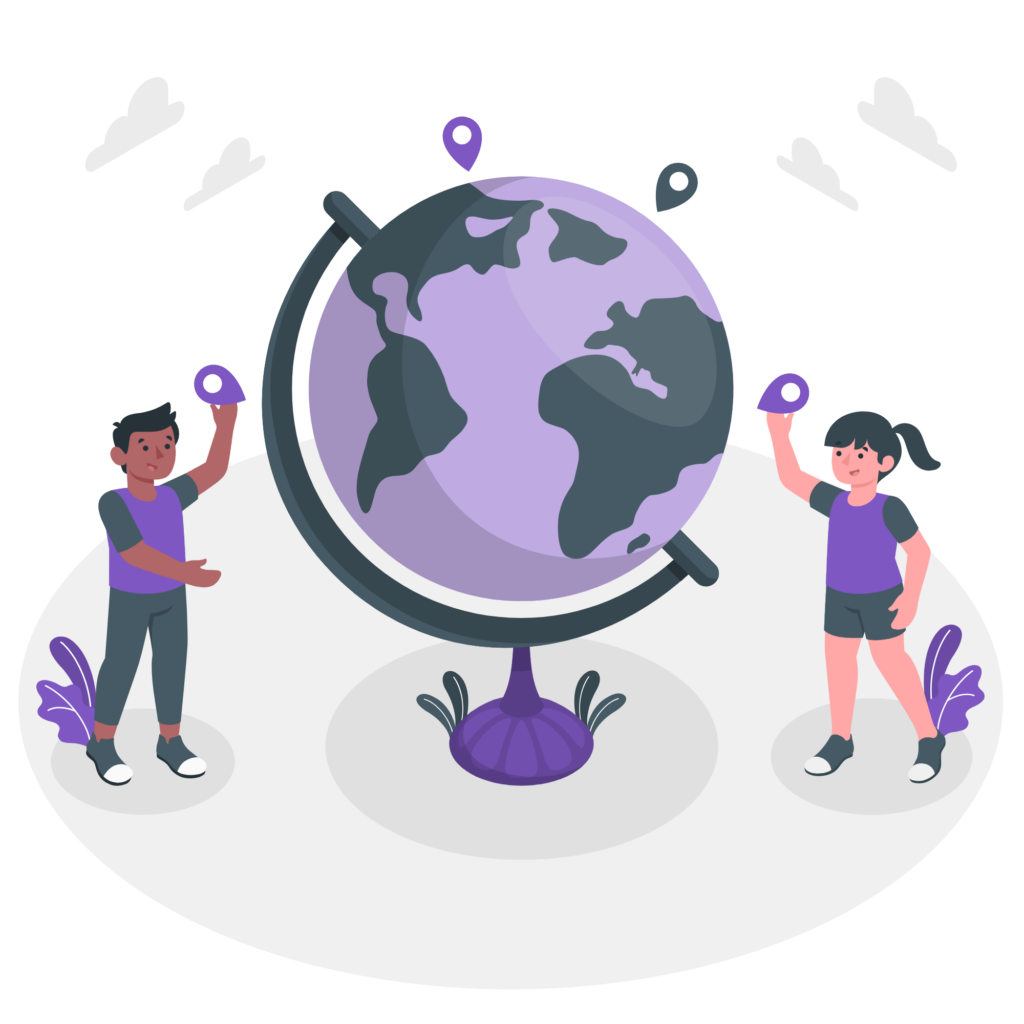Did you know 46% of all Google searches are for local info? This highlights how powerful local SEO is for businesses. As a small UK business owner in the UK, I’ve learned it’s key to stand out online.
Local SEO makes your business more visible in local Google searches. It boosts visibility in Google’s local search results, like the Google Map Pack. This is crucial for businesses wanting to draw in local customers. Google’s local search algorithms look at proximity, relevance, and prominence to show the best results.
With 61% of Google searches on mobile, local SEO is more important than ever, and knowing how Google handles local SEO is key. It uses indexing, where web crawlers build a database of info. By adding location-based factors, local SEO helps businesses show up in searches, especially on mobile. Whether it’s a small café or a big store, getting good at local SEO can help you stand out.
Key Takeaways
- Local SEO is crucial for businesses with physical locations or serving specific areas
- Google considers relevance, distance, and prominence in local search rankings
- Mobile-friendly websites are essential for local SEO success
- Optimising Google My Business profiles is key to improving local search visibility
- Consistency in online business information (NAP) is vital for local SEO
- Local keyword research helps target area-specific customers effectively
Understanding the Basics of Local SEO
Local SEO focuses on improving your visibility in location-based searches. It ensures your business shows up in results like Google Maps and other local search listings. This strategy is ideal for businesses aiming to reach customers in specific areas.
Importance of Local SEO for Businesses
Understanding local SEO is key for a business’s digital marketing plan. It boosts a business’s visibility in its area. By using local content and optimising Google My Business, businesses rank higher in local searches.
Local SEO adapts to Google’s algorithm changes, as shown in Moz’s Local Search Ranking Factors survey. With Google handling billions of local searches monthly, keeping up with these changes is crucial.
Here are some stats:
- 46% of all Google searches have local intent
- 76% of consumers who search for something local on their phone visit a store the same day
- 29% of Google search results contain a local pack
These numbers highlight the potential of Local SEO to drive both foot traffic and online engagement for businesses. Optimising for local search can get you into the Google local pack, making you more visible.
Local SEO Benefits | Impact |
Increased visibility | Appear in local map packs and organic results |
Trust and credibility | Robust local online presence |
Customer engagement | Direct interaction with local audience |
Mobile optimisation | Prioritised in search rankings |
Effective local SEO strategies can improve your online presence. By using effective local SEO strategies, businesses can attract and keep local customers who are looking for their products or services.
How Google Ranks Local Search Results
For businesses, understanding the Google local search algorithm is key. It helps them boost their local SEO. Local ranking factors are crucial in showing up in search results. Let’s dive into how Google ranks local searches and its impact on your business.
Local Search Algorithm
Google’s local search algorithm looks at many things to see if a business is relevant and important. Keeping your business info on Google up-to-date is crucial. This includes your address, contact details, and opening hours.
Google also values positive customer reviews. These show that customers are happy with your service. So, getting good reviews is a big plus.
Proximity Factor
The distance between you and the person searching is a big factor in local rankings. Businesses near the searcher are more likely to show up first. But being relevant and important can also help, even if you’re a bit further away.
To rank well locally, you need to work on both being close and being relevant. This means optimising your website and local listings.
Local Map Pack vs Organic Search Results
Google shows two kinds of results in local searches: the Local Map Pack and organic results. The Local Map Pack is at the top and has a map and three businesses. Being in this pack is great because it gets a lot of attention.
The businesses in the Local Map Pack are chosen based on how close they are, how relevant they are, and their reviews. Organic results come after and are based on how well your website matches the search and how authoritative it is.
To improve your local SEO, you should aim to do well in both the Local Map Pack and organic results. This means focusing on things like customer reviews and making sure your business details are complete and accurate.
Understanding these differences helps businesses plan better. They can work on both the Local Map Pack and organic results. This makes their local SEO efforts more effective.
- Ensure all business information is accurate and up-to-date.
- Encourage and maintain positive customer reviews.
- Focus on both relevance and proximity in optimisation efforts.
- Leverage Google My Business for maximising visibility.
- Monitor and adapt strategies to align with changing algorithms.
What is Local SEO and How Does It Work?
Local SEO helps businesses show up in searches for local products or services. It makes Google understand where a business is and what it offers. With 46% of Google searches looking for local stuff, knowing local SEO is key in 2024.
Relevance, Distance, and Prominence
To get noticed in local searches, focus on these Google criteria. Use location-specific keywords like “near me” or “in [city]” to boost relevance. Google automatically considers distance based on the user’s location.
Prominence is about reputation and popularity. Ratings and reviews play a big role here.
Local SEO Factor | Impact on Map Pack | Impact on Organic Results |
Google Business Profile | 36% | 6% |
Reviews | 17% | 5% |
Citations | 7% | 7% |
Links | 13% | 31% |
Optimising these local SEO factors can greatly increase a business’s chance of being in the top three in local search results.
How to Optimise Your Google My Business Profile
Optimising your Google My Business profile is a must for local SEO success. Verified businesses are more likely to appear in Google’s Local Map Pack and search results. I’ll show you how to improve your GMB profile and increase your local visibility.
Start by claiming and verifying your GMB listing. This step boosts your chances of showing up in local searches. Verified businesses are more likely to appear on Google Maps and Search.
Then, fill in all the details accurately. This includes your business name, address, phone number, website, and hours of operation. Keeping this info the same everywhere online is crucial for trust and optimisation.
- Add high-quality photos and videos
- Post regular updates, offers, and events
- Encourage and respond to customer reviews
- Use relevant categories and attributes
Did you know 84% of Business Profile views on Google come from discovery searches? This shows how important Google My Business optimisation is for attracting new customers.
Profile Element | Impact on Local SEO |
Accurate Business Information | Higher relevance in search results |
Customer Reviews | Improved rankings and customer trust |
Regular Posts and Updates | Increased profile activity and visibility |
Relevant Categories | Better profile visibility and feature access |
Google looks at your business’s prominence, including reviews and web presence. By following these tips, you’ll boost your local SEO and draw in more customers.
Conducting Local Keyword Research
Identify the keywords your target audience uses. Tools like Google Keyword Planner and SEMrush help uncover high-value local search terms. For example, phrases like “best plumber in Essex” or “SEO agency near me” can attract the right traffic.
Tools for Local Keyword Research
Many tools can help with local keyword research. SEMrush, Ahrefs, and Google Keyword Planner are popular choices. They give insights into search volumes, competition, and local keywords.
Analysing Competitor Keywords
Looking at your competitors’ keywords can reveal new opportunities. SEMrush’s Domain Overview helps find competitors. The Keyword Gap tool shows keywords they rank for but you don’t.
Using Google Auto-Complete and Keyword Planner
Google’s Auto-Complete is great for finding long-tail local keywords. Just type a local search query and note the suggestions. Google Keyword Planner gives more detailed data on search volumes and competition.
Tool | Primary Use | Key Feature |
SEMrush | Competitor analysis | Keyword Gap tool |
Ahrefs | Keyword difficulty | Keyword Explorer |
Google Keyword Planner | Search volume data | Free to use |
Focus on keywords with local intent, like “near me” or city-specific terms. A mix of broad and specific local keywords targets different search intents. This boosts your local SEO.
Creating and Optimising Local Content
Producing high-quality, locally relevant content helps you connect with your audience and improve your rankings. I’ll show you how to boost your local SEO with effective strategies.
Blog Posts and Local News
Writing about local events and news can really help your search rankings. Focus on topics that matter to your community. This will draw in more local visitors and make your business a trusted name.
Location Pages
For businesses with many locations, having specific pages for each is essential. Each page should have its own content, like address, hours, and services. This helps search engines see your local connection.
Mobile-Friendly Content
With 30% of mobile searches looking for local info, making your content mobile-friendly is a must. Make sure your site works well on phones and loads fast. This way, you’ll meet the needs of users searching on the go.
Content Type | SEO Impact | User Benefit |
Local Blog Posts | Improved local keyword rankings | Relevant local information |
Location Pages | Enhanced geographical relevance | Specific location details |
Mobile-Optimised Content | Better mobile search visibility | Seamless mobile browsing experience |
By using these tactics, you’ll build a strong local content strategy. It will appeal to both search engines and your audience.
Building and Monitoring Local Citations
Citations—mentions of your business name, address, and phone number (NAP) on other websites—play a significant role in local SEO. This can greatly improve your local search rankings. In fact, studies reveal that local SEO citations can make your business 18 times more visible online.
Importance of NAP Consistency
Keeping your NAP information consistent is crucial for local SEO success. When your business details match everywhere, you’ll rank higher in local searches. This consistency builds trust with search engines and potential customers. It’s important to regularly update your NAP information in all online directories to keep your rankings high.
Using Online Business Directories
Online business directories are great for building local citations. Sites like Google Business Profile, Bing Places, and industry-specific websites are popular choices. These structured citations help drive more commercial traffic. Remember, the quality and relevance of the directories matter more than the quantity.
Tools for Citation Management
Managing local citations can be a challenge, but there are tools to help. These tools track existing citations, spot inconsistencies, and find new opportunities. They make it easier to build and monitor your local citations.
Industry | Average Citations Needed |
Hotel | 152 |
Dental | 107 |
Medical | 101 |
General Business | 80 |
By focusing on high-quality, consistent local citations, you can boost your business’s visibility in local search results. This can attract more potential customers to your business.
Conclusion
Local SEO is an indispensable strategy for businesses looking to grow their local customer base. With almost half of all Google searches having local intent, investing in local SEO is more relevant than ever. This is especially true since 88% of smartphone users visit or call a store after a local search.
Having a strong local SEO plan brings big benefits. For example, 76% of people who search locally visit a store the same day. And 28% of these searches lead to a purchase. From optimising your Google My Business profile to creating engaging local content and managing citations, a strong Local SEO strategy positions your business to capture nearby customers ready to engage or make a purchase.
By focusing on these practical steps, your business can not only rank higher in local search results but also build trust and credibility within your community. Get started today to secure your place in the local market!




